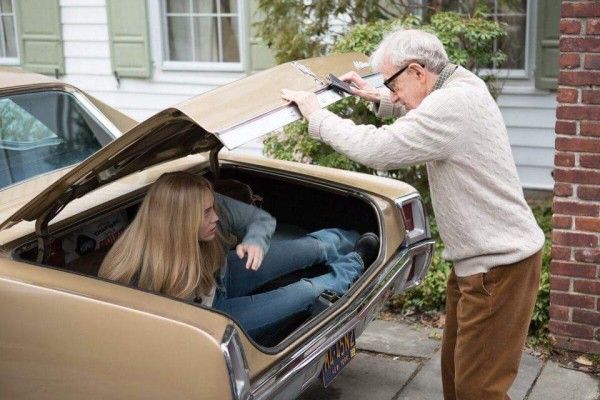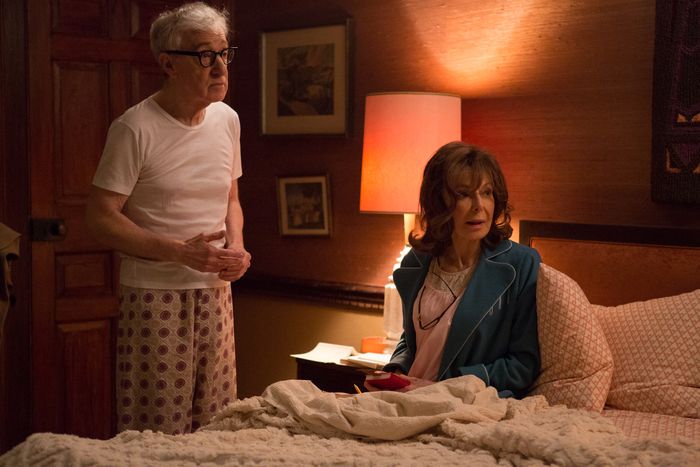Although Jesse Eisenberg plays the ostensible protagonist of Woody Allen’s most recent movie, Café Society, the writer-director fills a crucial role in the production. He narrates the movie, which takes place in the 1930s, and does so at an unmistakable remove, one that suggests numbness towards the past and toward the so-called “dream factory.” It’s a fascinating, captivating what-if with tremendous personal implications scattered through its unpredictable path. It’s a movie that only an older filmmaker could make, stripped of the romance of youth and the work.
In more than a few ways, Crisis in Six Scenes, Allen’s first foray into the series format, is also a work that wears the unavoidable handle of an older artist. It’s wisdom and honed wit, however, is still lively and resilient where the man behind Café Society came off as disappointed but also distanced by time. In this case, Allen is fully out in front of the camera, playing Sidney Munsinger, a wealthy retiree occasionally enjoying his late years with his wife, Kay (Elaine May). His life is all sweet routine until his wife let’s a famed radical leftist activist, Lennie (Miley Cyrus), stay at their place, eat their food, openly smoke pot, and make arrangements for violent acts of protests. In one particular scene, Lennie cops to being able to build bombs while listing off her skills to Sidney.
The series lacks the ruefulness that has given Allen’s recent works such an insidious, bitter, yet liberated sensibility, but there’s certainly a sense of reflection here. Much of the exchanges between the Munsingers, Lennie, and Munsinger friends Alan and Ellie (John Magaro and Rachel Brosnahan of House of Cards) is reminiscent of the stage comedies that Allen first built his name on. The shots are gorgeous, fluid, and unfussy and Allen doesn’t do a lot of cutting. Each shot is decisive, embedded with a rare technical mastery that never announces itself in the tightness of the compositions. He cedes much of the floor to his performers, per usual, and his entire cast here proves more than capable of delivering Allen’s dialogue while also thinking of intimate gestures and larger physical releases to electrify his frame.
The series is, if you’ll pardon me here, intensely white, set in the 1960s and featuring only one memorable African-American role. To his credit, Allen similarly refuses to romanticize the free-love era but he doesn't offer any particular challenge to his process or philosophy in the narrative. This is all to say that Woody Allen’s Amazon series looks and feels a lot like a Woody Allen movie. You have to believe in the importance of seeing Allen and May spar, two real-deal veterans of the comedy scene and two of the most sophisticated artists of cinematic comedies. Whether she’s sussing out marital troubles with Lewis Black as a marriage counselor or talking Chairman Mao with her elderly blook club, May’s sense of timing and delivery continue to make her a tremendous pleasure to watch on screen.
And Allen is definitely not on autopilot here, as the return to very simple, stage-friendly material might suggest. While talking with Cyrus’ radical as she plans an escape and an attack or speaking with his barber about his book, Allen feels more animated and entertained by the work than he has in quite some time. There’s undeniably something overall pleasant about Crisis in Six Scenes but tt’s not like the series is simply a congenial, well-acted comedy. In casting Cyrus in the role of a radical activist, Allen immediately ties the counter-culture of the 1960s to the liberal youth of today. As such, he depicts them as certainly vain and earnestly righteous, in love with the sound of their own voice and dismissive of those who don’t immediately agree with them. He also sees them as lively, intelligent, adventurous, hard working, and passionate, capable of even enlivening a cantankerous crank of his reputation.
One does wish that Allen imbued Crisis in Six Scenes with some of his more profound thoughts on growing old and facing death, and how that informs his unique moral compass. What his series ultimately comes to preach is a school of adaptability and social change, even if such things make him nervous and uncomfortable. The small yet substantial adventure that Lennie’s appearance sets him and his wife on gives him a genuine thrill and though Allen never dares get sentimental about such things, he’s rarely felt this existentially optimistic. The whole thing may seem patently ludicrous but it’s done with distinct artistic finesse, set to a furious, insidious visual rhythm in it’s bold, decisive, and intuitive editing. Herbie Mann’s rendition of “Comin Home Baby” is the film’s primary auditory touchstone, and the song’s very title seems to suggest a return to something familiar, while the music itself is laced with something menacing, mysterious, and very alluring.
Crisis in Six Scenes is available for streaming on Amazon Prime starting September 30th.
Rating: ★★★★







